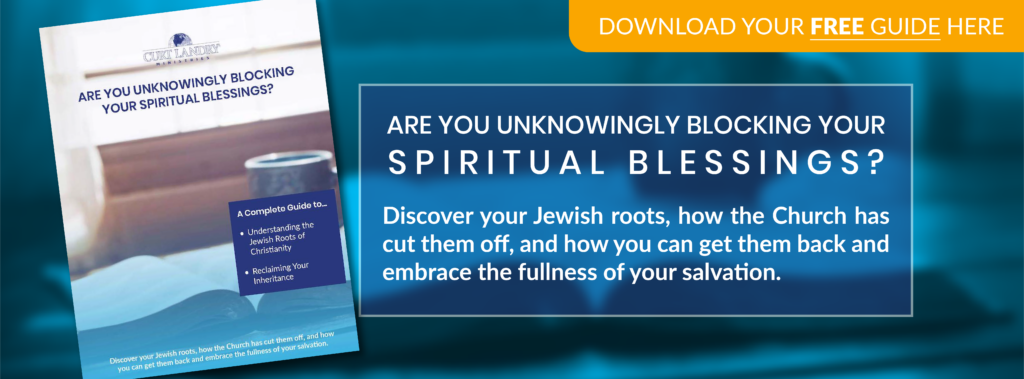The Great Commission in the Bible | A Hebraic Perspective (Part 2)
The Great Commission is something that nearly every born-again Believer has heard of and understands as part of their calling. We often picture fulfilling the Great Commission as either moving to a remote area of the world and sharing the gospel with those who live there or proclaiming the dangers of not surrendering to Christ to anyone who crosses our path.
Although there are times and places for both of these situations, this can be an overwhelming assignment and intimidating for most people. So how are you to fulfill the Great Commission?
As mentioned in Part 1, wherever God places you is your mission field.
Essentially, every place you go, you are in full-time ministry.
The answer to how to fulfill the Great Commission lies in looking at it from a Hebraic perspective. It might change your point of view and give you the courage, strength, and understanding you need to fulfill this high calling.
Have You Ever Thought about the Fulfillment of the Great Commission from a Hebraic Perspective?
Perhaps you have never read or studied the Great Commission from a Hebraic perspective. But think about this… How was the original message taught and written? In the context of the Hebraic culture and language.
Therefore, many blessings are missed out on when the depth of the command or commission isn’t known.
In Part 1 of The Great Commission in the Bible | A Hebraic Perspective, we discovered…
- Where the Great Commission is in the Bible.
- The Great Commission from a Western perspective.
- The Great Commission from a Hebraic perspective.
- That living the Great Commission from a Hebraic perspective is not about legalism.
If you missed Part 1, click HERE to read it!
In Part 1, we discovered the Hebrew translation of the words, command and commandment. It is mitzvah—or mitzvot (plural). The mitzvot are thought of as guides that point us in the right direction.
As we continue our journey of discovery in Part 2, we will discover why it is important to understand the Great Commission from a Hebraic perspective and three steps you can take to align more with God’s heart.
The Importance of Understanding the Great Commission from a Hebraic Perspective
In order to fully grasp the richness and depth of Yeshua’s last instruction, we must understand the context and the culture of when it was written.
The Great Commission provides instruction for—and points us to—living a life that reflects God so that disciples are made in every nation (Matthew 28:19-20).
The Hebrew word for disciple is talmid—talmidim is plural. The word stresses the relationship between the teacher, or rabbi, and the disciple, or student—talmid.
Understanding the Richness of the Talmidim
Through a Westernized lens, we could falsely assume the relationship between the talmid and the rabbi was nothing more than a student learning from a teacher.
However, in Hebraic thought, the talmid didn’t just seek to know what the teacher knew; his or her entire life was dedicated to becoming like the teacher and to doing what the teacher did—because the talmid understood the great blessing that flowed from the close relationship.
Fulfilling the Great Commission is, in part, seeking to be more like Christ and to teach and train others His ways, encouraging them to do so as well.
Unlocking the Mysteries of the Great Commission from a Hebraic Perspective
Our Western culture reads the Bible without considering the context in which it was written. This is something that Believers must be aware of if they want to unlock the mysteries and depth of God’s Word.
In the Old Testament, we are told that the Word of God is His teachings. The teachings are the Torah. Yeshua always pointed back to the Father and used the Torah as a foundation for His teachings. Therefore, we must heed His teachings if we want to grow in our knowledge and truth of Him—which ultimately points back to God the Father.
Thus, you see the relationship between the mitzvot and Yeshua.
- Yeshua is said to be the Word of God (John 1:1).
- Yeshua—the Word of God—is the way to the Father (John 14:6).
- Yeshua—the Word of God—only does what the Father does (John 5:19).
As mentioned before, the talmid sought to become and do what his teacher did.
How is the Spirit prompting you today to better align with God’s will and Word?
By Aligning with Yeshua’s Commands, God Promises To…
- “’He who has My commandments and keeps them, it is he who loves Me. And he who loves Me will be loved by My Father, and I will love him and manifest Myself to him.’”—John 14:21
Dwell with You
- “Jesus answered and said to him, ‘If anyone loves Me, he will keep My word; and My Father will love him, and We will come to him and make Our home with him.’”—John 14:23
Fill You with Joy As You Abide in Him
- “’If you keep My commandments, you will abide in My love, just as I have kept My Father’s commandments and abide in His love. These things I have spoken to you, that My joy may remain in you, and that your joy may be full.’”—John 15:10–11
Empower You to Show Love to Others
- “Now by this we know that we know Him, if we keep His commandments. He who says, ‘I know Him,’ and does not keep His commandments, is a liar, and the truth is not in him. But whoever keeps His word, truly the love of God is perfected in him. By this we know that we are in Him.”—1 John 2:3-5
Answer Your Prayers
- “And whatever we ask we receive from Him, because we keep His commandments and do those things that are pleasing in His sight.”—1 John 3:22
What You Can Do Today to Align with God’s Heart for the Great Commission
1. Pray—We are to pray without ceasing, giving thanks always, and let our requests be made known to God.
- “Rejoice always, pray without ceasing, in everything give thanks; for this is the will of God in Christ Jesus for you.”—1 Thessalonians 5:16-18
- “Be anxious for nothing, but in everything by prayer and supplication, with thanksgiving, let your requests be made known to God;”—Philippians 4:6
2. Sow—If we want more courage, we must encourage others. If we want more compassion, we must show compassion to others. If we want more direction, we must seek God’s direction by spending time in His Word daily. Seeking His ways aligns our ways.
- “Do not be deceived, God is not mocked; for whatever a man sows, that he will also reap.”—Galatians 6:7
- “For where your treasure is, there your heart will be also.”—Matthew 6:21
3. Reap—When we align with His commission, command, or mitzvah, it changes our mind, will, and emotions, opening the doors to blessings.
- “Delight yourself also in the Lord, and He shall give you the desires of your heart.”—Psalm 37:4
- “’But seek first the kingdom of God and His righteousness, and all these things shall be added to you.’”—Matthew 6:33
It is our hope and prayer that as you pray, sow, and reap according to God’s instruction, you will be encouraged to share those blessings with others.
In Summary…
We have learned that, from a Hebraic perspective, fulfilling the Great Commission is not just about going out and proclaiming the gospel. It’s about living a life that sets us apart from the world and reflects God’s mitzvot.
It is the mitzvot that point others to who Christ truly is—what He did and continues to do in the life of every Believer. It is the mitzvot that empowers you to fulfill your purpose in the Great Commission.
Once we are born again, we have a high calling to step away from our old mind, will, and emotions and put on the mind of Christ—becoming more like Him.
Understanding your faith and Great Commission from a Hebraic perspective sheds practical light on how to live a life in alignment with God’s will so that others see Him. The Great Commission is a call for us to live in such a way that Deuteronomy 28:10 is revealed…
“Then all the peoples on earth will see that Adonai’s name, his presence, is with you; so that they will be afraid of you.”—(CJB)

